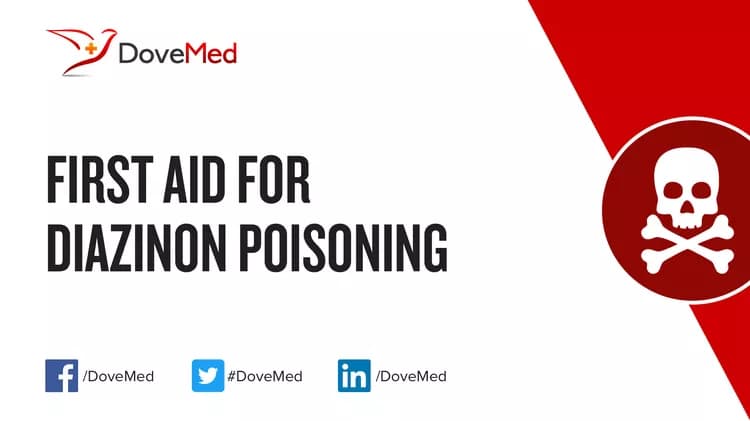What is Diazinon Poisoning?
- Diazinon is a chemical compound that forms an ingredient of many pesticides. It is used in gardens, farms, and fields, to control a wide variety of insects and vermin. The compound is also used to protect pets against flea bites
- Diazinon Poisoning is the accidental or intentional intake of any product containing the toxic compound
- The condition is diagnosed based upon the clinical history, combination of signs and symptoms, and additional tests (that may include, in some cases, radiological studies and laboratory tests)
Diazinon Poisoning or Diazinon Toxicity may be also referred to variously as the following:
- Bazinon Poisoning
- Diazol Poisoning
- Gardentox Poisoning
- Knox-Out Poisoning
- Spectracide Poisoning
What are the Causes of Diazinon Poisoning?
- Diazinon Poisoning is caused by the intake or ingestion of diazinon compound. The substance may also cause symptoms due to skin contact
- This intake could be accidental, or in some cases intentional, to bring self-harm
Note: The compound can interact with other prescribed or non-prescribed medications in the body. Such interactions may enhance the therapeutic effects of other medications being taken, resulting in undesired side effects.
What are the Signs and Symptoms of Diazinon Poisoning?
The signs and symptoms of Diazinon Poisoning can vary from one individual to another and depends upon the quantity consumed. It may be mild in some and severe in others. Several systems of the body, such as the digestive system, nervous system, vascular system, respiratory system, skin and ENT may be affected.
The signs and symptoms of Diazinon Poisoning may include:
- Nausea, vomiting, cramping of stomach/abdomen
- Chest pain or tightness
- Breathing difficulties; absence of breathing
- Headaches
- Irregular heart-rate
- Increased or decreased blood pressure (hypertension or hypotension respectively)
- Confusion and increased nervousness
- Seizures
- Bluish skin (especially lips and fingernails)
- Salivation, increased tearing of eyes, sweating
- Vision abnormalities; dilated pupils, lack of sensitivity to light
- Coma
How is First Aid administered for Diazinon Poisoning?
First Aid tips for Diazinon Poisoning:
- If the individual with Diazinon Poisoning is in a coma, or is experiencing life-threatening symptoms, call 911 (or your local emergency help number) immediately
- Call the Poison Control Center at 1-800-222-1222 (or your local poison control center) for further instructions
- Provide them with information such as the compound taken, quantity and time of ingestion, age, weight and general health status of affected individual
- Confirm that the airways are protected; also, ensure breathing and the presence of pulse
- If skin or eye exposure has occurred, then wash thoroughly with copious amounts of water
- Take individual to emergency room (ER) for further treatment
- Always try to take the product bottle/container to the ER
- Dispose contaminated clothing, while wearing protective gloves/gear, based on suitable instruction of poison control center
The emergency medical health professional might perform the following steps towards treating the condition:
- Decontaminate the individual before starting treatment (usually done by the first responders)
- If necessary, gastric lavage for elimination of substance from the stomach (irrigation using special solutions)
- Administer suitable medication to counter effects of the toxin
- Medically manage symptoms, such as abnormal heart rate and seizures
- Provide breathing support, if necessary
- Wash skin and eyes repeatedly and thoroughly (irrigation), to eliminate any remaining hazardous compound
- Administer laxatives for elimination of the substance from the body
- Administer fluids by an intravenous drip line
Who should administer First Aid for Diazinon Poisoning?
First aid for Diazinon Poisoning is administered by healthcare professionals.
- The individual who is affected, or someone near, should call 911 for emergency assistance (or the local emergency number)
- They should also call the poison control center at 1-800-222-1222 (or the local poison control center) and follow instructions
What is the Prognosis of Diazinon Poisoning?
- The prognosis of Diazinon Poisoning is dependent on the amount of substance consumed, time between consumption and treatment, severity of the symptoms, as well as general health status of the patient
- If the individual can recover from the symptoms within a period of 4-6 hours, with appropriate medication and support, the outcome is generally good. However, in many cases, prolonged medical support/treatment is necessary to ensure a full recovery
- In case of severe symptoms including abnormal heart rhythms, seizures, and coma, it may considerably worsen the outcome. Some symptoms may persist for an extended period
In general, toxicities are common situations in the emergency departments. A majority of the cases are often not fatal, when appropriate treatment is given.
How can Diazinon Poisoning be Prevented?
Diazinon Poisoning can be prevented by:
- Keeping poisonous/hazardous chemicals and other materials out of children’s reach
- Always follow instructions for usage of any chemical products
- Wearing appropriate protective wear when working with such chemicals
- Being aware of basic first aid steps in case of an emergency (such as inadvertent poisoning)
What are certain Crucial Steps to be followed?
- Call 911 (or your local emergency number) for emergency assistance, if symptoms are life-threatening
- Call Poison Control Center at 1-800-222-1222 (or the local poison control center) and follow the recommend steps
- It would be helpful if the following information is readily available:
- Type, amount and time of consumption of the substance
- Age and weight of the individual
- And, the overall health status of the individual
Related Articles
Test Your Knowledge
Asked by users
Related Centers
Related Specialties
Related Physicians
Related Procedures
Related Resources
Join DoveHubs
and connect with fellow professionals


0 Comments
Please log in to post a comment.